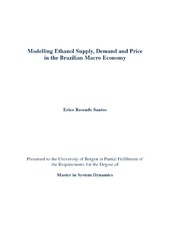Modelling ethanol supply, demand and price in the Brazilian macro economy
| dc.contributor.author | Santos, Erico Resende | eng |
| dc.date.accessioned | 2012-10-25T05:57:49Z | |
| dc.date.available | 2012-10-25T05:57:49Z | |
| dc.date.issued | 2012-06-27 | eng |
| dc.date.submitted | 2012-06-27 | eng |
| dc.identifier.uri | https://hdl.handle.net/1956/6142 | |
| dc.description.abstract | The Brazilian program for sugarcane ethanol has been greatly successful since its inception about 40 years ago. But the road has been bumpy and today there are still major problems with price, supply and demand stability. This paper describes a research with the objective to propose policies by the government to stabilise and foster the Ethanol market in Brazil. The policies are tested by simulation. For that purpose a system dynamics model was built and calibrated to mimic the industry. Once the model is considered robust, it is used to test several proposed policies under different macroeconomic scenario forecasts. Historical evidence and the simulations suggest that the dynamics in the system are highly important in defining prices and other important variables. Shifts in sugar and gasoline prices have big short term and delayed influence in the ethanol market dynamics. The effects of long term dynamics are mixed with several short and long term cycles typical of commodities markets and the combination increases complexity exponentially. Simulation can be a crucial tool for understanding causality and planning sound policies for the medium to long terms. | en_US |
| dc.format.extent | 4701411 bytes | eng |
| dc.format.mimetype | application/pdf | eng |
| dc.language.iso | eng | eng |
| dc.publisher | The University of Bergen | eng |
| dc.subject | Ethanol | eng |
| dc.subject | Brazil | eng |
| dc.subject | System dynamics | eng |
| dc.title | Modelling ethanol supply, demand and price in the Brazilian macro economy | eng |
| dc.type | Master thesis | en_US |
| dc.rights.holder | Copyright the author. All rights reserved | en_US |
| dc.description.localcode | GEO-SD360 | |
| dc.description.localcode | JMASV-SYSD | |
| dc.subject.nus | 733199 | eng |
| fs.subjectcode | GEO-SD360 |
Tilhørende fil(er)
Denne innførselen finnes i følgende samling(er)
-
Department of Geography [627]
